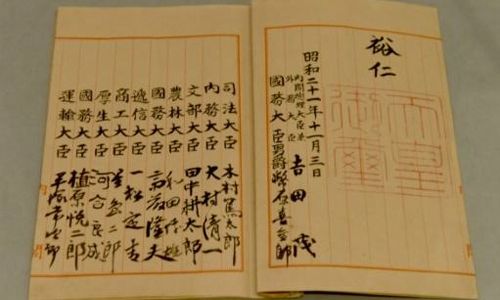Japan's 'peace constitution' under pressure at 70
Tokyo : Japan's American-written "peace constitution" has survived unchanged for 70 years, but nationalists seeking an overhaul are gearing up for a major new push as concerns grow over North Korean belligerence.
Conservatives have long called for the document they see as a national humiliation to be amended, but current political alignments and growing security concerns suggest they now have their best chance of success.
"The time is ripe," Prime Minister Shinzo Abe said Monday in a speech to supporters of change. "We will take a historic step towards the major goal of revising the constitution in this milestone year."
The constitution, which took effect 70 years ago on Wednesday, renounced Japan's sovereign right to wage war. It has been championed by progressives as a pacifist symbol born out of the country's World War II defeat.
Supporters argue the document is a bulwark against any repeat of Japan's World War II aggression, and warn attempts to revise it risk whitewashing the country's modern history.
But nationalists deride it as an alien charter forced on the country by an occupying power -- the United States -- bent on imposing its own Western values.
And they see those who defend its emphasis on peace as dangerously out of tune with geopolitical realities, such as North Korea's nuclear and missile programmes.
"The fault lines of Japanese politics very much run through the constitution," said Kenneth Ruoff, professor of modern Japanese history at Portland State University in the United States.
Abe has long vowed to bring it more in line with what conservatives see as Japanese values, such as greater emphasis on obligations rather than rights, and on the family not the individual.
While unlikely to seek the complete removal of the popular and war-renouncing Article 9, they advocate changes to its wording, such as recognising the country's self-defence forces as a military and clarifying Japan's right to defend itself.
Pro-amendment parties can now muster the two-thirds majorities necessary in both houses of parliament to pass changes, though they would be subject to a national referendum for final approval and that is seen as the biggest hurdle.
Related Posts

